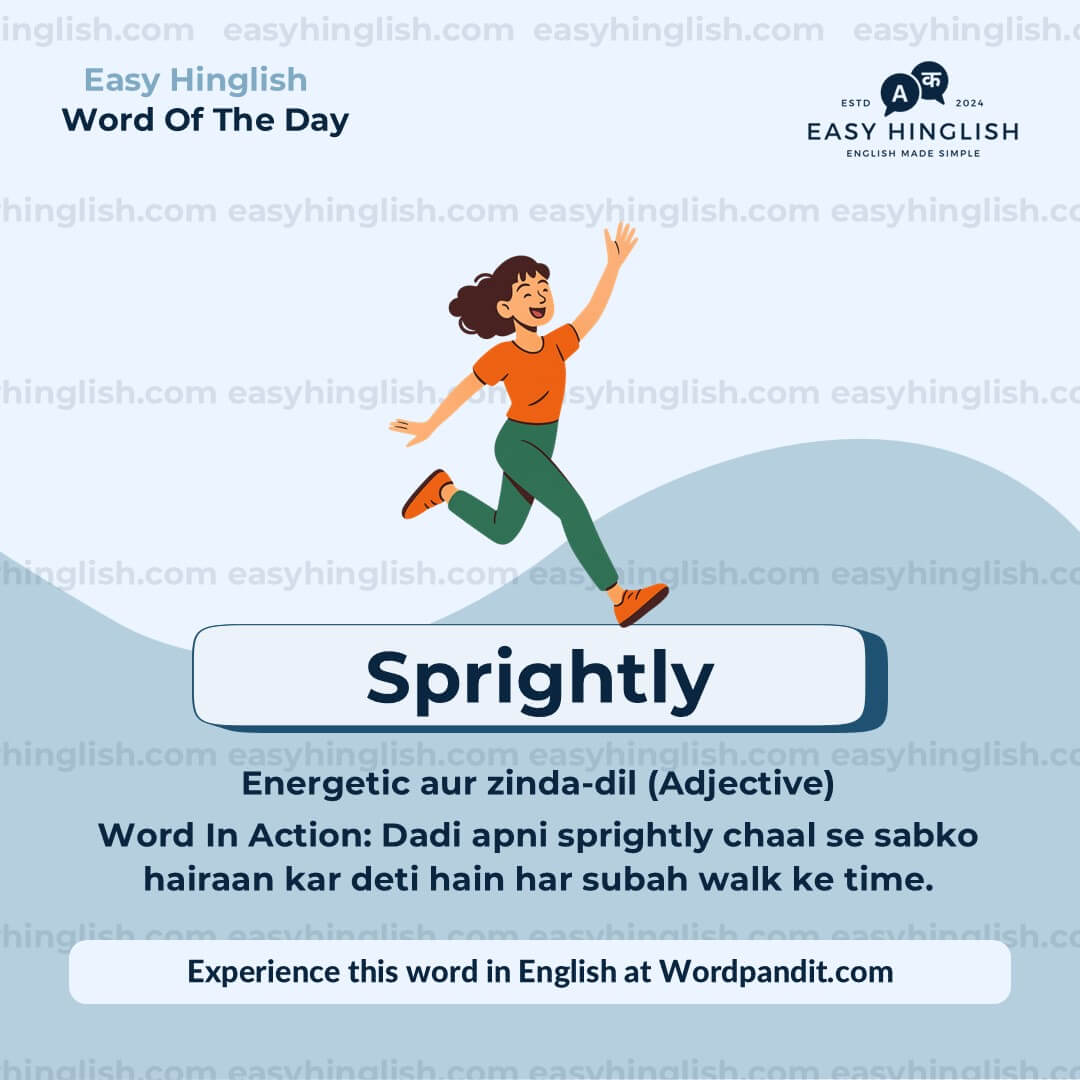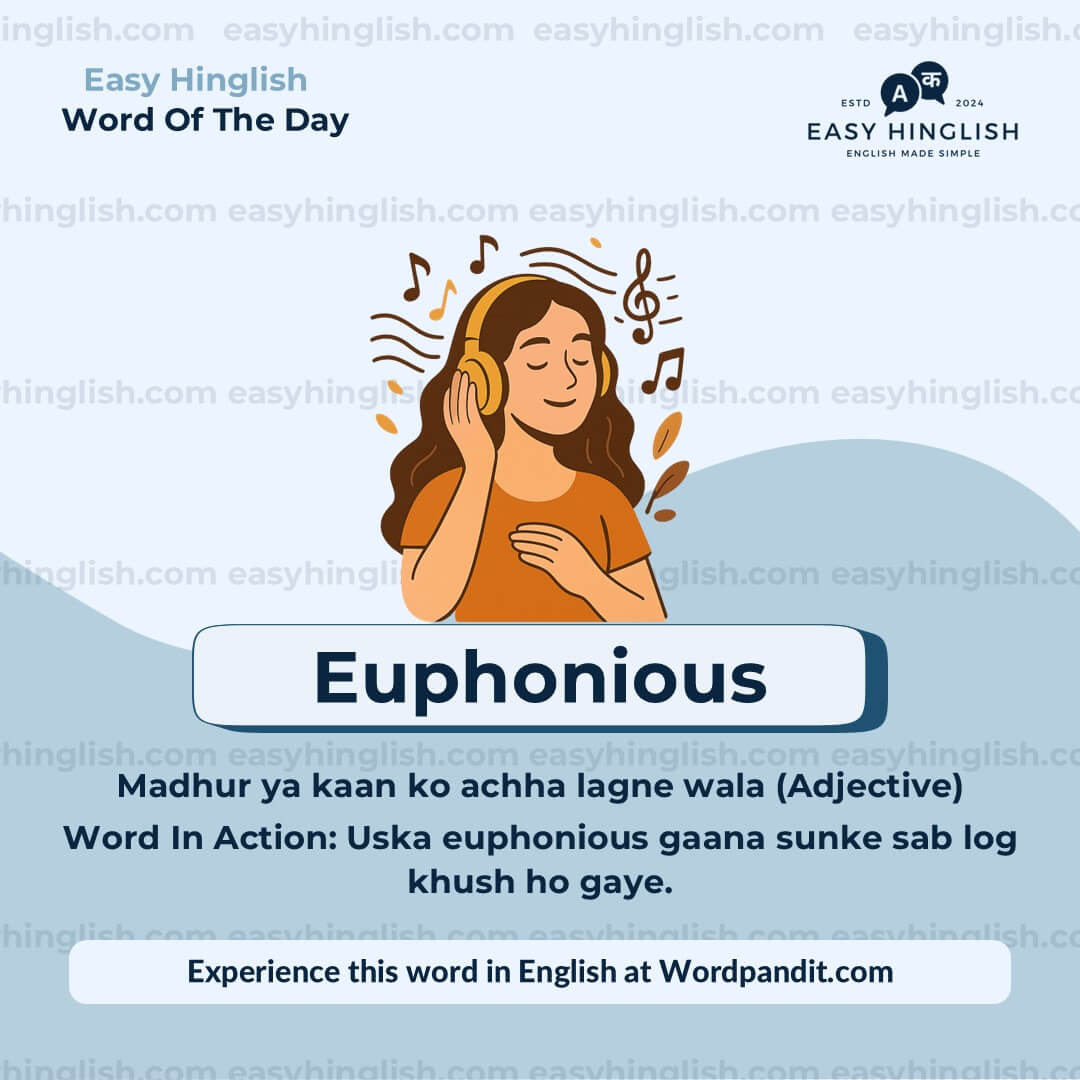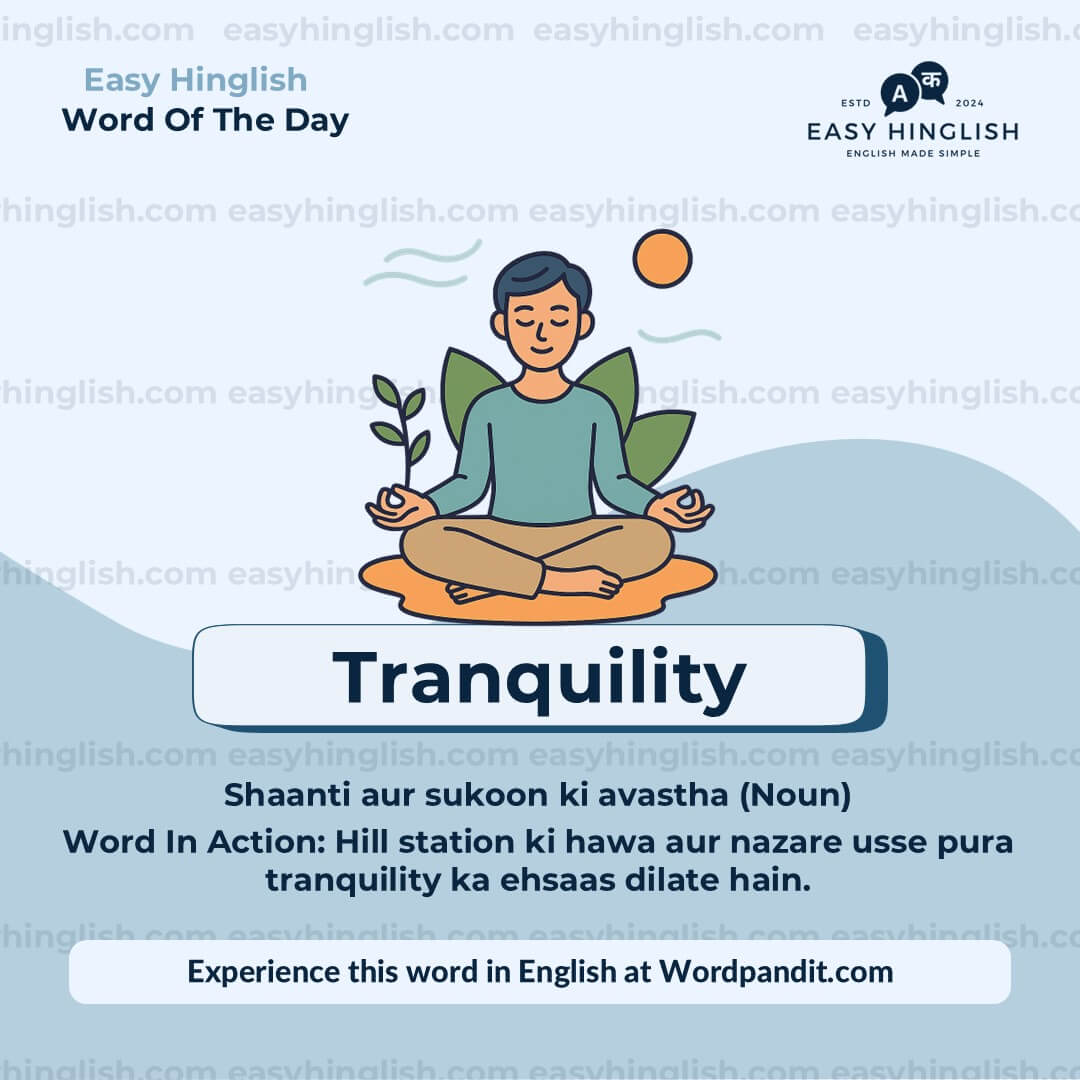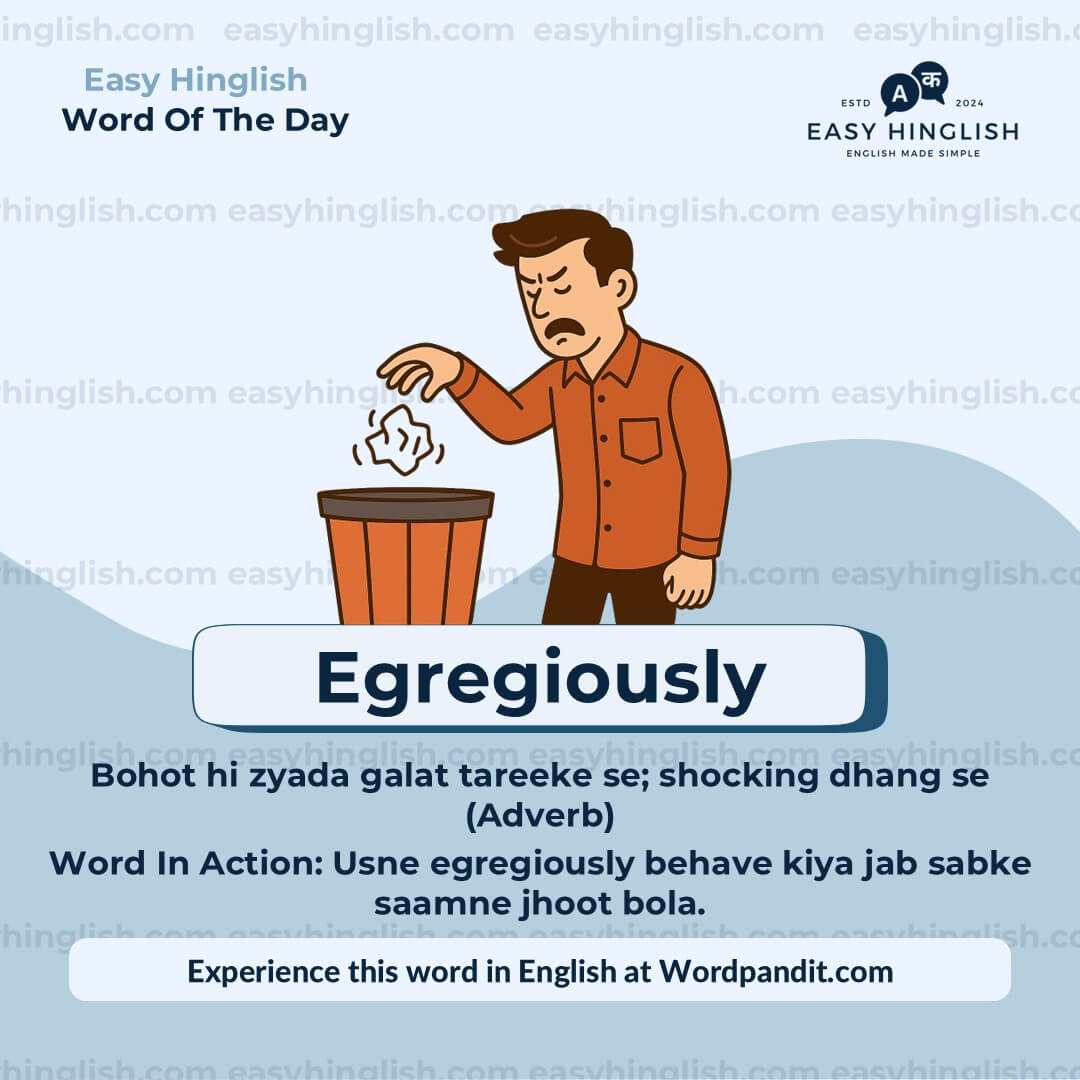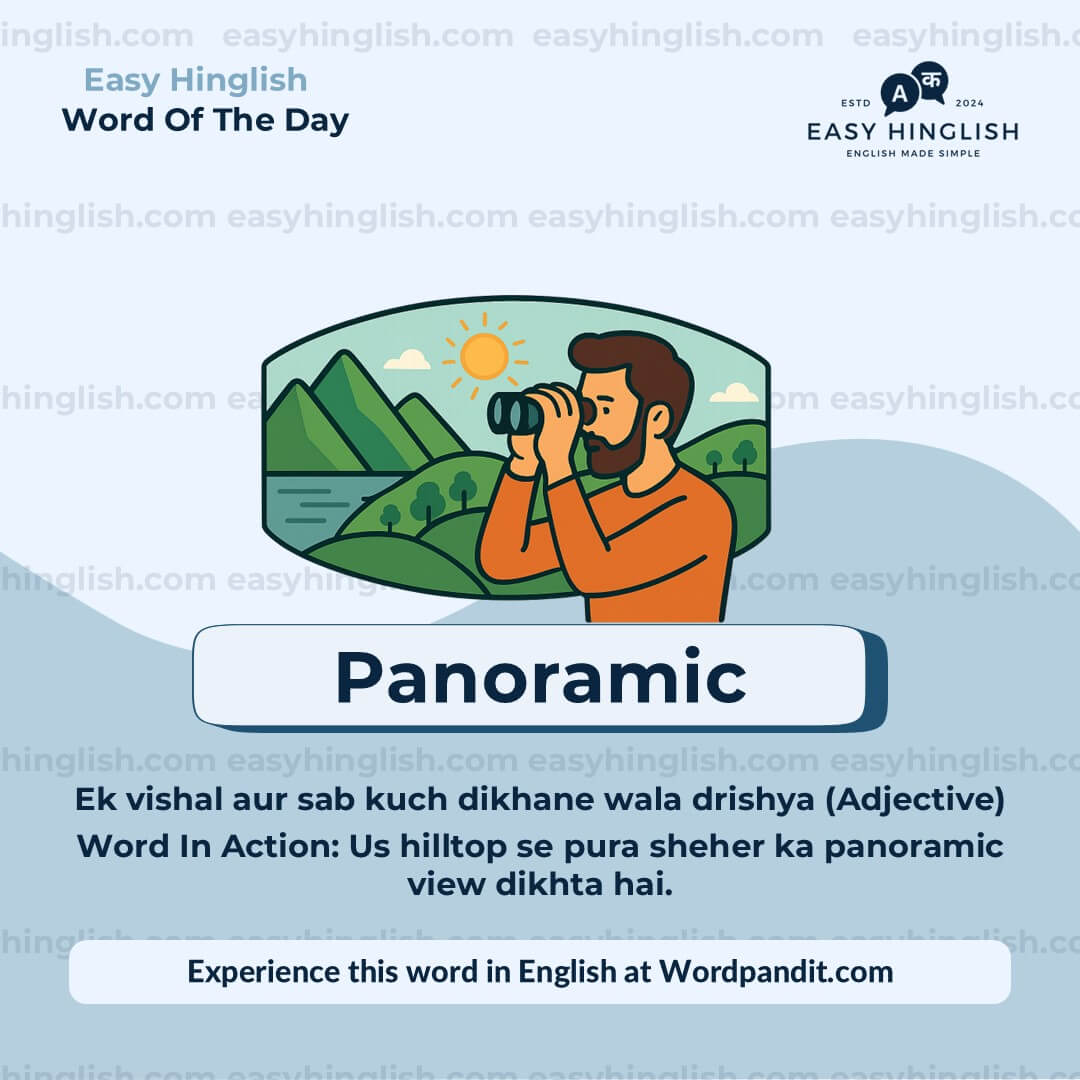Daily Vocabulary Indian Newspapers aur Publications se Seekho
Welcome to Wordpandit ka Indian Vocabulary Hub
Wordpandit par, hum samajhte hain ki ek achhi vocabulary develop karne ke liye local context samajhna bhi zaroori hai. Is section ka focus hai aapke vocabulary ko India ke leading newspapers aur publications se naye shabdon aur phrases ke zariye improve karna, taaki aap practical, relevant, aur uniquely Indian words seekh sakein.
Indian Sources Itne Important Kyun Hain?
Hum maante hain ki kisi bhi language ko sikhne ka sabse best tareeka hai uske local content me immerse hona. Isi wajah se hum carefully words curate karte hain top Indian newspapers aur publications se, jaise:
- The Hindu
- The Times of India
- The Economic Times
- Hindustan Times
- Live Mint
- The Indian Express
- Aur bhi bahut saare...
Hamesha Updated Raho, Hamesha Relevant Raho
Daily updates ke saath, aap Indian news sources se naye words seekhoge jo Indian society aur culture ke latest trends ko reflect karte hain. Hamara focus hai aise words provide karna jo aapke liye real-world me useful ho.
Wordpandit Aapke Learning Goals Ko Kaise Support Karta Hai?
Chahe aap exams ki preparation kar rahe ho, professional communication improve karna chahte ho, ya sirf naye words seekhna chahte ho, Wordpandit har step par aapki madad karega.
Practical Tareeke Se Seekho
Hamari interactive learning methodology me real-world examples, engaging activities, aur context-based usage shamil hain, taaki har naya shabd aapki active vocabulary ka hissa ban sake.
Aaj Hi Indian Vocabulary Seekhna Shuru Karo!
Wordpandit Kyun Choose Karein?
Practical Learning: Aise words seekho jo aapko real-world reading aur communication me sach me kaam aayenge, taaki aapki comprehension aur bolne ki skills improve ho.
Diverse Content: Current affairs se lekar scientific breakthroughs tak, hamare different sources aapko multiple domains ka vocabulary sikhate hain.
Effortless Integration: Wordpandit ko apni daily routine ka part banao. Sirf kuch minute har din dene se aapki vocabulary time ke saath kaafi improve ho sakti hai.
Aapka Vocabulary Mastery Tak Ka Safar
- Regularly hamare Daily Vocabulary section ko visit karo
- Naye words explore karo aur unka context me use samjho
- In words ko apni writing aur bolne ki practice me use karne ki koshish karo
- Jaise-jaise aapke words badhte hain, apni progress ko track karo
Aaj Se Apni Vocabulary Journey Shuru Karo!
Wordpandit ke saath vocabulary improve karna start karo. Roz thoda effort dalne se aap ek strong vocabulary develop kar sakte ho jo academic, professional, aur personal life me kaafi kaam aayegi.
Yaad rakho, ek naya shabd roz seekhna linguistic limitations ko door karne ka best tareeka hai! Wordpandit ko apni daily learning journey ka sathi banao aur vocabulary excellence ki taraf badho!
WORD-1: Sprightly
Sandarbh (Context):
"The park thrummed with energy— and so did our little group, despite the yawning age gap between my grown-up daughters and my niece’s sprightly, single-digit-aged sons." - The Times Of India
Vyakhya (Explanatory Paragraph):
"Sprightly" un logo ko describe karta hai jo kaafi lively, energetic aur full of enthusiasm hote hain—chahe woh bacche ho ya bude log. Is context mein, chhote bacche sprightly kehkar describe kiye gaye hain, jiska matlab hai ki woh kaafi active aur khushi se bhare hue the, jo unke buzurg rishtedaron ke contrast mein dikha gaya hai.
Arth (Meaning): Energetic aur zinda-dil (Adjective)
Uccharan (Pronunciation): SPRY-tlee
Kathinai Star (Difficulty Level): ⭐⭐
Utpatti (Etymology): "Spry" se aaya hai, jo Scandinavian origin ka hai—Norwegian *sprett* se, jiska matlab hota hai jump ya leap.
Prashant Sir Ke Tathya (Prashant Sir's Notes):
Ye word aksar un logo ke liye use hota hai jo expected age ke bawajood kaafi chust-durst aur active hote hain—jaise bude log ya chhote bacche. Isse aapke likhne ka style aur expressive ho jaata hai, especially jab aap kisi ke energy ya movement ko describe karna chahte hain.
Samanarthi & Vipritarthi (Synonyms & Antonyms):
Samanarthi (Synonyms): lively, energetic, vibrant, spirited, vivacious
Vipritarthi (Antonyms): sluggish, lethargic, listless, dull, lifeless
Udaharan (Usage Examples):
- Grandma apni 80s mein bhi shaadi mein sprightly tareeke se dance kar rahi thi.
- Sprightly puppy poore maidan mein titliyon ke peeche bhaag raha tha.
Sanskritik Sandarbh (Cultural Reference):
"Angela Lansbury, the sprightly star of 'Murder, She Wrote,' was known for her boundless energy even in her later years." - Entertainment Weekly
Sochiye (Think About It):
Kya aapne kabhi kisi bude vyakti ko sprightly dekha hai? Aapko kaisa laga unka aise energetic rehna dekh kar?
Chhoti Kriya (Quick Activity):
Ek park ka chhota sa scene likho jahan aap kisi sprightly insaan ya janwar ka zikr karo.
Yaad Karne Ka Tarika (Memory Tip):
"Sprightly" yaad rakhne ke liye "sprite" yaani chhoti fairy jaisi socho—jo hamesha chanchal aur chust hoti hai!
Vastavik Jeevan Me Upyog (Real-World Application):
Agar aap kisi fiction story ya travelogue likh rahe ho jahan lively movements ya cheerful nature batana ho, tab “sprightly” use kar sakte ho—ye word aapke writing ko aur visual bana deta hai.
WORD-2: Euphonious
Sandarbh (Context):
"...now come here from her retreat in Dehradun to demand the restoration of civil liberties and an end to her niece‘s autocracy; from several student leaders (none from my college); and from the Jana Sangh ideologue, Atal Bihari Vajpayee, in cultured and euphonious Hindi, wisecracks and witticisms aplenty." - The Telegraph online
Vyakhya (Explanatory Paragraph):
"Euphonious" aise sounds ya boli ko describe karta hai jo kaan ko sukhad lage—jaise madhur awaz, ya smooth bol-chal. Context mein Atal Bihari Vajpayee ki Hindi ko euphonious kaha gaya hai—matlab unki boli na sirf cultured thi, balki usme ek musical, poetic quality bhi thi jo unke witty dialogues ko aur bhi impactful banati thi.
Arth (Meaning): Madhur ya kaan ko achha lagne wala (Adjective)
Uccharan (Pronunciation): yoo-FOH-nee-uhs
Kathinai Star (Difficulty Level): ⭐⭐⭐
Utpatti (Etymology): Greek shabd *euphonos* se aaya hai—*eu-* matlab “achha” aur *phone* matlab “sound”, yaani “achhi awaz”.
Prashant Sir Ke Tathya (Prashant Sir's Notes):
Yeh word un situations mein kaafi useful hai jahan aap kisi sound, language, ya music ki khoobsurti ko express karna chahte hain. Ye “cacophonous” ka ulta hai, jo harsh ya irritating sound ko dikhata hai. Euphonious ka use aapke likhne mein elegance la sakta hai.
Samanarthi & Vipritarthi (Synonyms & Antonyms):
Samanarthi (Synonyms): melodious, harmonious, musical, tuneful, lyrical
Vipritarthi (Antonyms): cacophonous, jarring, discordant, harsh, grating
Udaharan (Usage Examples):
- Poet ki awaaz itni euphonious thi ki poora audience mesmerized ho gaya.
- Woh hamesha apne fantasy novels ke characters ke liye euphonious names choose karti hai.
Sanskritik Sandarbh (Cultural Reference):
"Barack Obama ke speeches ka euphonious cadence unki rhetorical style ko graceful bana deta tha." - Public Speaking Review
Sochiye (Think About It):
Kya aapko lagta hai ki hum madhur boli ya music se zyada emotionally connect karte hain? Kyun?
Chhoti Kriya (Quick Activity):
5 aise shabd likho jo aapko euphonious lagte hain. Unhe zor se bolke dekho aur socho—kya unmein koi rhythm ya flow hai?
Yaad Karne Ka Tarika (Memory Tip):
“Eu” ka matlab hota hai “good” aur “phonious” matlab “sound”. Soch lo: “You phone us”—aur hum enjoy karte hain kyunki awaz itni pleasant hoti hai!
Vastavik Jeevan Me Upyog (Real-World Application):
“Euphonious” ka use music reviews, speeches ke feedback, ya kisi language ke sound ko describe karne mein hota hai. Aap isse apne creative writing mein use karke tone ko aur classy bana sakte hain.
WORD-3: Tranquility
Sandarbh (Context):
"We concluded that he must be an agent of the Intelligence Bureau, deputed to check on whether, in fact, peace and tranquility prevailed on the campus." - The Telegraph online
Vyakhya (Explanatory Paragraph):
"Tranquility" ka matlab hota hai ek aisi sthiti jahan sab kuch shaant, sukoon bhara aur disturbance se door ho. Ye word environment ke liye bhi use hota hai—jaise ek shaant park ya sukoon bhari shaam—aur dimaag ke liye bhi, jaise ek person jo andar se calm feel kar raha ho. Is sentence mein yeh bataya gaya hai ki campus ki shaanti ko ensure karne ke liye Intelligence Bureau ka agent bheja gaya tha.
Arth (Meaning): Shaanti aur sukoon ki avastha (Noun)
Uccharan (Pronunciation): trang-KWIL-ih-tee
Kathinai Star (Difficulty Level): ⭐⭐
Utpatti (Etymology): Latin shabd *tranquillitas* se aaya hai, jiska matlab hota hai calm aur quiet.
Prashant Sir Ke Tathya (Prashant Sir's Notes):
Ye ek bahut hi soft aur positive word hai, jo aksar “chaos” ya “disturbance” ke opposite mein use hota hai. Aap ise descriptive writing ya meditation contexts mein use karke apne writing ko aur peaceful bana sakte ho.
Samanarthi & Vipritarthi (Synonyms & Antonyms):
Samanarthi (Synonyms): peace, calm, serenity, quietness, stillness
Vipritarthi (Antonyms): chaos, turmoil, disturbance, unrest, agitation
Udaharan (Usage Examples):
- Toofan ke baad gaon mein ek sukoon bhari tranquility waapas aa gayi.
- Meditation uski inner tranquility ko banaye rakhne mein madad karta hai.
Sanskritik Sandarbh (Cultural Reference):
"Tranquility Base" ka naam diya gaya tha Apollo 11 ke Moon landing site ko—jo space mein peace ka pratinidhitva karta hai. - NASA Archives
Sochiye (Think About It):
Aaj ke noisy aur fast-paced world mein, aapko sabse zyada tranquility kahaan milti hai?
Chhoti Kriya (Quick Activity):
Tin aise moments ya jagahon ka zikr karo jahan aapne pura sukoon aur tranquility mehsoos kiya ho. Socho, unhe special kya banata hai?
Yaad Karne Ka Tarika (Memory Tip):
“Tranquil” ko “tranquilizer” se yaad rakho—jo kisi ko calm kar deta hai. Tranquility wahi feeling hai—jab sab kuch shaant ho.
Vastavik Jeevan Me Upyog (Real-World Application):
Tranquility ka use nature writing, meditation blog, ya political speeches mein hota hai—jaise “peace and tranquility” ka use legal ya diplomatic language mein bhi kiya jata hai.
WORD-4: Egregiously
Sandarbh (Context):
"Even at the time I found it grossly offensive, since the credit that properly accrued to our cricketers was being egregiously accorded to an authoritarian politician instead." - The Telegraph online
Vyakhya (Explanatory Paragraph):
"Egregiously" ka matlab hota hai kisi kaam ko itne bure tareeke se karna ki wo shocking lagne lage. Jab koi galti ya anyay itna glaring ho ki use ignore karna mushkil ho, tab is word ka use hota hai. Is sentence mein ye bataya gaya hai ki ek neta ko cricketers ke achievements ka credit dena ek egregious galti thi—jo bilkul unfair aur openly galat tha.
Arth (Meaning): Bohot hi zyada galat tareeke se; shocking dhang se (Adverb)
Uccharan (Pronunciation): ih-GREE-jus-lee
Kathinai Star (Difficulty Level): ⭐⭐⭐⭐
Utpatti (Etymology): Latin shabd *egregius* se aaya hai jiska asli matlab hota tha “excellent” ya “distinguished”, lekin time ke saath iska negative use hone laga jab koi galti ya offense bahut hi clear aur glaring ho.
Prashant Sir Ke Tathya (Prashant Sir's Notes):
“Egregiously” un situations ke liye best hai jahan aap kisi baat ko strongly criticize karna chahte ho. Ye word aapke sentence ko zyada powerful aur impactful banata hai, especially jab aap kisi badi galti ya injustice ka zikr karte hain.
Samanarthi & Vipritarthi (Synonyms & Antonyms):
Samanarthi (Synonyms): flagrantly, outrageously, blatantly, shockingly, grossly
Vipritarthi (Antonyms): mildly, subtly, acceptably, reasonably
Udaharan (Usage Examples):
- Report mein facts ko egregiously misrepresent kiya gaya tha.
- Usne staff ke saath egregiously rude behavior kiya, sab log uski taraf ghoor rahe the.
Sanskritik Sandarbh (Cultural Reference):
"Company ke egregiously high executive bonuses ne financial crisis ke dauraan logon ka gussa badha diya." - Wall Street Journal
Sochiye (Think About It):
Aapke nazar mein ek simple mistake aur ek egregious galti mein kya farak hota hai? Kya woh intention se decide hota hai ya result se?
Chhoti Kriya (Quick Activity):
Do sentences likho—ek chhoti galti ka, aur ek egregious error ka. Fir compare karo ki “egregiously” use karne se tone kitna intense ho jata hai.
Yaad Karne Ka Tarika (Memory Tip):
“Egregiously” sunte hi socho “Eek!”—jaise kuch shocking dekh kar react karte ho. "Eek! That was egregious!"
Vastavik Jeevan Me Upyog (Real-World Application):
“Egregiously” formal writing, journalism, aur legal language mein commonly use hota hai, jab kisi major galti ya injustice ko sharply highlight karna ho. Essays, analysis aur reports mein ye word kaafi powerful hota hai.
WORD-5: Panoramic
Sandarbh (Context):
"From the panoramic grandeur seen from the Edge to the ant’s perspective from the footpaths, the city stands upright, unblinking, undeterred." - The Times Of India
Vyakhya (Explanatory Paragraph):
"Panoramic" ka use tab hota hai jab hum kisi wide, sab kuch cover karne wale nazare ya drishya ki baat karte hain—jaise ek pahaadon ka poora view ya sheher ka skyline. Is sentence mein "panoramic grandeur" ka matlab hai ek badi, majestic aur all-encompassing view jo "the Edge" jaise high point se dikhti hai. Yeh contrast karta hai neeche footpath se chhoti, detail-focused nazar ke saath—aur yeh sheher ki har angle se strength ko dikhata hai.
Arth (Meaning): Ek vishal aur sab kuch dikhane wala drishya (Adjective)
Uccharan (Pronunciation): pan-uh-RAM-ik
Kathinai Star (Difficulty Level): ⭐⭐
Utpatti (Etymology): Greek *pan* (sab) + *horama* (drishya), aur English mein French *panoramique* ke zariye aaya 19th century mein.
Prashant Sir Ke Tathya (Prashant Sir's Notes):
"Panoramic" ek highly visual aur poetic shabd hai, jo aapke likhne mein grandeur aur depth laata hai. Travel blogs, descriptive essays ya analytical writing mein jab aap kisi cheez ka complete view dena chahte ho—yeh word best kaam karta hai. Yeh literally aur metaphorically dono sense mein use hota hai.
Samanarthi & Vipritarthi (Synonyms & Antonyms):
Samanarthi (Synonyms): wide-ranging, sweeping, all-encompassing, scenic, broad
Vipritarthi (Antonyms): narrow, limited, restricted, confined
Udaharan (Usage Examples):
- Hiking karne ke baad humein valley ka panoramic view mila—jo breathtaking tha.
- Uski speech ne desh ke economy ka ek panoramic overview diya.
Sanskritik Sandarbh (Cultural Reference):
"Panoramic" term sabse pehle 19th century mein popular hui jab cylindrical paintings logon ko 360-degree immersive view dene lagi—yeh ek early form tha visual storytelling ka. - The Oxford History of Art
Sochiye (Think About It):
Aap jab kisi cheez ko panoramic (broad) view se dekhte ho aur phir close-up se, toh aapki understanding kaise badalti hai?
Chhoti Kriya (Quick Activity):
Ek panoramic photo choose karo (mountains, skyline, etc) aur 5 sentence mein vivid description likho—"panoramic" shabd ka use zaroor karo.
Yaad Karne Ka Tarika (Memory Tip):
Apne phone ka "panorama mode" yaad karo—jo wide photo leta hai. Waise hi "panoramic" ka matlab hota hai sab kuch cover karne wala view.
Vastavik Jeevan Me Upyog (Real-World Application):
“Panoramic” ka use travel descriptions, photography, real estate ads, documentaries aur metaphorical analysis mein hota hai—jaise ek complete ya broad perspective dikhane ke liye.



